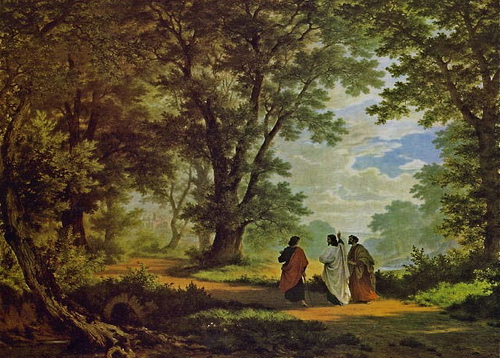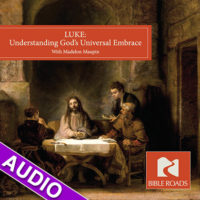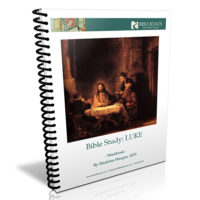This Easter season it’s a good time to recall one of the most moving stories following the crucifixion: the two followers, cleopas and his friend, walking to the village of Emmaus. This community was only about five kilometers south of Jerusalem, but the story is about geography with a theological punch: they’re leaving Jerusalem. It wasn’t just the capital city they departed, where – by the way – thousands had traveled from around the Empire to come to, for Passover.

“The Walk to Emmaus”, by Gemälde von Robert Zünd (Wikimedia) Cleopus was one of the two disciples who met Jesus during the appearance on the road to Emmaus
These two believers in Christ’s good news were despondent, heartsick, on the verge of losing hope. Jerusalem symbolized not only their master’s cruel death but the end of his message – they thought.
Only Luke, of the Gospel writers, ties geography to theology. Both his Gospel and 2nd volume of Acts, start in Jerusalem. And where? Ground zero for a Jew: the Temple, where Zechariah the priest is visited by an angel who tells him of an unexpected son — John the Baptist.
Cleopas and his friend assumed Jesus’ ministry had ended in Jerusalem with the trial and crucifixion. The city that had offered so much promise now cheated their dreams and they couldn’t wait to leave. But these two were leaving before the promised baptism at Pentecost would galvanize them with the reality of the resurrection and presence of the Holy Spirit.
Told in the final chapter of Luke’s Gospel, we learn that the resurrected Christ suddenly “walked along with them” (Luke 24:13-34), came to retrieve them, to call them ‘home’ to Jerusalem. After Cleopas and his friend snapped out of their mesmeric fixation on Jesus’ death to witnessing his resurrection, everything changed.
What ‘Jerusalem’s’ are we walking away from? Where are our hopes dashed only to be recovered by a resurrected Christ who comes at the depth of despondency? This is the Christian story. This is how we share in his resurrection.
Not only would Christ Jesus’ followers eventually leave Jerusalem, making increasingly larger concentric circles teaching, preaching and healing, but they would boldly take their gospel to Rome itself.
Have you thought about your ‘Jerusalem’ – what you might be walking away from? And what about your ‘Rome’ – where you need to courageously go? We’d love to hear your comments, insights, sharing.



